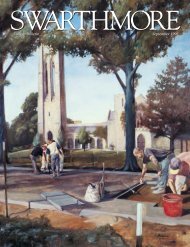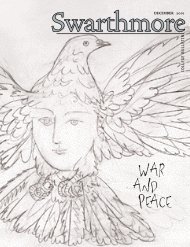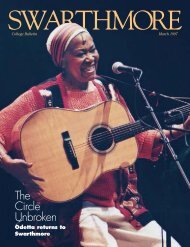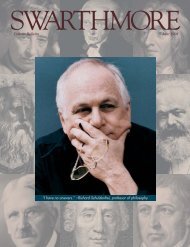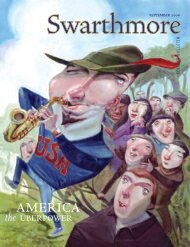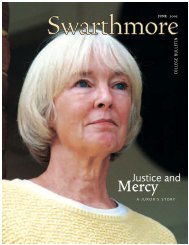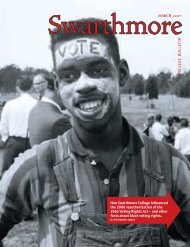A Walk in the Woods
Swarthmore College Bulletin (March 2001) - ITS
Swarthmore College Bulletin (March 2001) - ITS
You also want an ePaper? Increase the reach of your titles
YUMPU automatically turns print PDFs into web optimized ePapers that Google loves.
aseball becomes <strong>the</strong> apo<strong>the</strong>osis of segregationand race war, with one all-whiteleague and one all-black:All games, <strong>the</strong>n, will be a racial clash.I have a dream, Roomie, of high-fly<strong>in</strong>gspikes, of pitchers deck<strong>in</strong>g hitters, ofbody-crash<strong>in</strong>g drama at home plate, ofviolence and rumors of violence.... Baseballwill become <strong>the</strong> heart and soul ofracist America, br<strong>in</strong>g<strong>in</strong>g <strong>in</strong> crowdsbeyond <strong>the</strong> greediest club owner’sdream. The World Series, <strong>the</strong>n, wouldbe a modern reprise of <strong>the</strong> Civil Waritself. I have a dream, Roomie, where <strong>the</strong>wrote. “No one ever blamed anyone fortak<strong>in</strong>g <strong>the</strong> money…. It was a phrase thatcould wear a man down, whittl<strong>in</strong>g away athis resistance until <strong>the</strong> wound was raw, <strong>the</strong>spirit <strong>in</strong>fected.... It might take a man half alifetime to develop his powers to resist—and less than an hour to sell <strong>the</strong>m out.”Eliot As<strong>in</strong>of hasn’t bought <strong>in</strong>, and hehasn’t sold out. An upper-middle classkid, a top student, a star athlete, he was byhis own admission a “straight arrow.”When he and some friends got caughtpa<strong>in</strong>t<strong>in</strong>g a red “S” on a Haverford Collegebuild<strong>in</strong>g on <strong>the</strong> eve of a football game, heBETTMANN/CORBISHIS BOOKS ARE PEOPLED WITH OUTSIDERS,OUTLAWS, AND OUTCASTS—AND HE DOESN’TMIND IF YOU THINK OF HIM THAT WAY TOO.th<strong>in</strong>ks you’re a troublemaker.”“Why did you hire me, <strong>the</strong>n?”shot backAs<strong>in</strong>of.“I hired you because of it.”Sayles and As<strong>in</strong>of became close friends.As<strong>in</strong>of calls Sayles’ film “a reaffirmation.Suddenly, here comes a first-class guy whosurrounds himself with first-class people.He knew what <strong>the</strong> movie bus<strong>in</strong>ess is like.Mak<strong>in</strong>g that picture was a lot of fun at atime when I had a tendency to become cynical.”But As<strong>in</strong>of’s problems weren’t over. Themovie should have provided a goldenopportunity for <strong>the</strong> first best-seller of As<strong>in</strong>of’s40-year writ<strong>in</strong>g career. “But on <strong>the</strong>day <strong>the</strong> film opened,” he says, “<strong>the</strong>re wasnot one copy of my book <strong>in</strong> <strong>the</strong> City ofNew York,” nor anywhere else <strong>in</strong> <strong>the</strong> country.Despite months of advance notice fromAs<strong>in</strong>of about <strong>the</strong> movie, his publisher neglectedto br<strong>in</strong>g out a new pr<strong>in</strong>t<strong>in</strong>g to co<strong>in</strong>cidewith <strong>the</strong> release of <strong>the</strong> film.In many of As<strong>in</strong>of’s books, you f<strong>in</strong>d aspeech or passage that is clearly <strong>in</strong> <strong>the</strong>author’s voice—usually a cry aga<strong>in</strong>sthypocrisy or <strong>in</strong>justice. In Off-Season, protagonistCagle’s black roommate, Corky,makes an angry “I Have a Dream” speechabout <strong>the</strong> future of race <strong>in</strong> America. In thisballplayer’s dream—a nightmare really—bullshit hypocrisy of America’s quest forracial amity will once and for all beabandoned.“Is this you? Your voice <strong>in</strong> Corky’sspeech?” I asked As<strong>in</strong>of. “Do you th<strong>in</strong>kthat <strong>the</strong> quest for racial amity is false?”“Yes,” he said quietly. “That’s me. That’sabsolutely me.... Any black will tell youthat—except those who buy <strong>in</strong> to <strong>the</strong> whiteworld. The big leaguers now, <strong>the</strong>y’re allbuy<strong>in</strong>g <strong>in</strong>.”“But you have to understand,” he says.“Part of my education as a writer was <strong>the</strong>impact of all my lefty friends. In [<strong>the</strong>1930s], that was respectable, at least until<strong>the</strong> McCarthy period, when <strong>the</strong>y all went tojail or got blacklisted. You identified with<strong>the</strong> outsider because that’s what you are—an alienated character <strong>in</strong> American society.It still exists <strong>in</strong> my work. In a world of peoplewho buy <strong>in</strong>, I’m always try<strong>in</strong>g to resist.”As<strong>in</strong>of spent <strong>the</strong> late 1950s <strong>in</strong> Hollywood,married for a time to Marlon Brando’ssister, but returned to New York <strong>in</strong>1959. “I got out of LA by luck,” he says. Itrem<strong>in</strong>ded me of a passage about <strong>the</strong> film<strong>in</strong>dustry from his book Bleed<strong>in</strong>g Between <strong>the</strong>L<strong>in</strong>es.“Take <strong>the</strong> money. Take <strong>the</strong> money.Unquestionably, it was <strong>the</strong> s<strong>in</strong>e qua non ofsurvival <strong>in</strong> <strong>the</strong> enterta<strong>in</strong>ment bus<strong>in</strong>ess,” hesays Dean Everett Hunt was almost <strong>in</strong>shock to f<strong>in</strong>d him among <strong>the</strong> miscreants.But Swarthmore changed him. Hisbooks are peopled with outsiders, outlaws,and outcasts—and he doesn’t m<strong>in</strong>d if youth<strong>in</strong>k of him that way too. He’s <strong>the</strong> selfstyledn<strong>in</strong>th man out, <strong>the</strong> uncompromis<strong>in</strong>gtough guy of a professional ballplayer, completewith <strong>the</strong> “F— ’em all” attitude. Yet <strong>in</strong>his work, <strong>the</strong>re’s <strong>in</strong>telligence and compassion;he celebrates <strong>the</strong> <strong>in</strong>dividual’s abilityto fight life’s battles, to stand <strong>in</strong> aga<strong>in</strong>st <strong>the</strong>high, tight fastball.He remembers exactly when <strong>the</strong> lightwent on <strong>in</strong> his head—<strong>the</strong> crucial moment<strong>in</strong> his education—<strong>in</strong> a sem<strong>in</strong>ar with legendaryProfessor of Economics ClareWilcox.“One night we went to his home for <strong>the</strong>sem<strong>in</strong>ar, and he said, ‘Leave all your stuffhere—we’re go<strong>in</strong>g <strong>in</strong>to Philadelphia.’Seven or eight of us drove <strong>in</strong>to Philadelphiato see John Ste<strong>in</strong>beck’s movie Grapesof Wrath.“Then we came back to his house—itwas close to midnight, but his wife madetea and served cookies—and he spent <strong>the</strong>next hour talk<strong>in</strong>g about <strong>the</strong> economics ofGrapes of Wrath. I learned a lot about whatAmerica was like that night.“I’ve never forgotten that,” he saidquietly. TM A R C H 2 0 0 135



